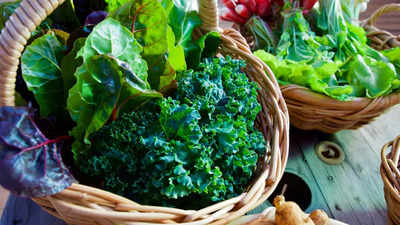Trending
7 Life-changing vegetables that are a must after 30s
Including nutrient-dense vegetables like spinach, broccoli, carrots, sweet potatoes, kale, tomatoes, and bell peppers in your diet after 30 can greatly benefit overall health. These vegetables provide essential vitamins, minerals, and antioxidants, supporting heart health, digestion, bone density, and skin health, thus helping to manage age-related health issues effectively.
As we age, our body needs more nutrition as well as care to deal with the ever-changing challenges of life. From slackening digestive health to low metabolic health to loss of muscle mass and an increase in the risk of chronic health issues like heart disease, diabetes, and osteoporosis, which calls for a diet that has the right balance of nutrient-dense veggies that can support as well as boost overall health. Here are some simple, life-changing veggies that are worth including in the daily diet after 30 to keep age-related issues at bay.
Spinach
Spinach is one of the most healthy and nutrient-packed leafy greens that can help in improving overall health and well-being. This is due to the ample nutrients such as iron, folate, vitamin K, vitamin A and fiber, to name a few. In fact, as we age, maintaining healthy iron levels becomes more important to prevent anemia and fatigue. Apart from that, spinach also has high folate content that supports heart health and can help in maintaining a healthy blood pressure level. Vitamin K is crucial for bone health, which becomes increasingly important in your 30s as bone density tends to decline with age. Spinach can easily be added to subzis, smoothies, salads, or cooked dishes to boost your nutrient intake.

Another underrated yet nutritious vegetable is broccoli, which makes for a healthy addition to the daily diet. Loaded with fiber, vitamin C and antioxidants such as sulforaphane, a compound that has been shown to help fight cancer and support detoxification. As per a study published in the National Library of Medicine, it was mentioned that sulforaphane in broccoli provides cancer protection via the alteration of several epigenetic and non-epigenetic mechanisms; this was demonstrated in the case of many types of cancer. Moreover, broccoli is a great source of calcium, which plays a vital role in maintaining bone density. As you enter your 30s, focusing on bone health and fighting oxidative stress becomes crucial, and broccoli is one of the best vegetables for protecting your body against chronic conditions like arthritis and inflammation.

Carrots
Carrots are also packed with beta-carotene, which the body converts into vitamin A. This vitamin is essential for maintaining good vision, supporting skin health, and boosting the immune system. As we age, the elasticity of skin begins to decline, making antioxidants like vitamin A more important for skin repair and radiance. Moreover, carrots are high in fiber content, which helps in digestion and promotes a healthy gut, which can prevent bloating and other digestive issues that are common as we age. Enjoy them raw as a snack, in salads, or cooked in stews.
Sweet Potatoes
Sweet potatoes are loaded with complex carbohydrates, fiber, and vitamin A in the form of beta-carotene. They are also a great source of potassium, which helps manage blood pressure and heart health. The fiber in sweet potatoes aids in digestive health by supporting regular bowel movements and maintaining gut health, which can be an issue as we age. Additionally, the antioxidants in sweet potatoes help reduce inflammation and support healthy skin, making them an excellent food for people in their 30s who want to age gracefully. Roast, mash, or add them to soups for a nutrient-packed meal.
Kale
Kale is another much underrated leafy green, which can totally help in boosting immunity as well as metabolic health. The reason why this green is a must-have after your 30s is because it is packed with vitamin C, vitamin K, calcium, and fiber. Vitamin C is essential for collagen production, which helps maintain skin elasticity and reduces the appearance of fine lines and wrinkles, a common concern as we age. The calcium in kale supports bone health, and the fiber helps with digestion and weight management. Kale’s antioxidants also help protect the body from oxidative damage, which can lead to premature aging and chronic diseases. Add kale to your diet in smoothies, salads, or soups.
Tomatoes
Tomatoes are rich in lycopene, a powerful antioxidant that has been shown to protect against heart disease and cancer. Lycopene also supports skin health by protecting it from harmful UV rays and preventing premature aging. In your 30s, cardiovascular health and maintaining youthful skin become key priorities, and tomatoes provide an excellent combination of nutrients to help with both. They are also a good source of vitamin C and potassium, which contribute to a healthy immune system and blood pressure regulation. Add tomatoes to salads or sauces, or enjoy them roasted as a side dish.
Bell Peppers
Bell peppers, particularly the red variety, are rich in vitamin C and antioxidants, which are vital for immune health and fighting oxidative stress. Vitamin C boosts collagen production, promoting healthy skin, and its antioxidant properties help protect the body from inflammation and chronic diseases. In your 30s, your metabolism tends to slow down, and the high water content and fiber in bell peppers can help regulate metabolism and support digestion. They are also a low-calorie food that can be incorporated into a variety of dishes, from salads to stir-fries.
Get real-time updates on Budget 2025 and Income Tax Slabs on Times of India. Check out the latest income tax slabs FY 2025-26.
End of Article
FOLLOW US ON SOCIAL MEDIA
Visual Stories
Tired of too many ads?go ad free now




















